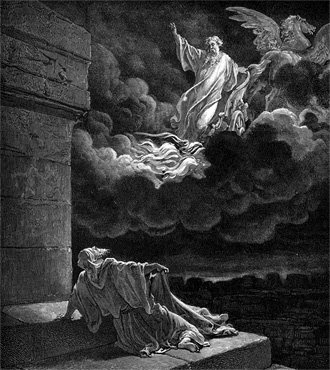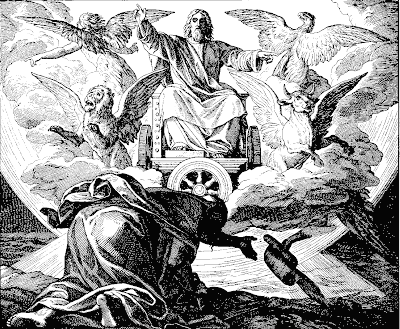This lesson is about the transition of the prophetic office from Elijah to his successor, Elisha, and the ministry of Elisha to the people of Israel. One of the first things that one may notice, after reviewing and comparing the narratives concerning Elijah and Elisha is that there are many similarities between them, especially in the types of miracles that they perform. Each performs a miracle involving an increase of oil for a poor widow (1 Kgs. 17:8–16; 2 Kgs. 4:1–7); both raise a child from the dead (1 Kgs. 17:17–24; 2 Kgs. 4:18–37). While some scholars have argued that the Elijah stories are a later expansion of the Elisha account, if we follow the biblical narrative we could conclude that Elisha’s ministry was so similar to Elijah’s because of the “double-portion” of Elijah’s spirit that Elisha received (2 Kgs. 2:9; more on this later).
![]()
Elisha, also known as Eliseus in some traditions (based on the Greek), was the attendant or “apprentice” of Elijah. His name in Hebrew means “my God is salvation” (interesting note: the name Elisha is thus similar to Jahoshua or Yeshua (Hebrew for Jesus) meaning “Yahweh is salvation”).
We read in the second chapter of 2 Kings that as Elijah reaches the end of his ministry, he travels with Elisha to a number of towns in Israel. Before departing to the next town, Elijah requests that Elisha remain, but Elisha refuses and continues to accompany his master faithfully. At each new site, Elisha is approached by “the sons of the prophets,” who question him as to whether he knows that “the Lord will take away thy master from thy head today?” These sons of the prophets are understood to be part of a prophetic “guild” that existed in Israel, perhaps a sort of “school of the prophets.” Apparently, there were fairly large groups of these men in the various towns who had some degree of prophetic ability. They were seemingly inspired by God to know that Elijah would be taken by God that same day. It seems to me that there was some degree of competition/tension between them and Elisha, as if they were trying to prove that they knew something more about Elisha’s master than he did. However, at each stop Elisha lets these individuals know that he is very well aware already of what is about to happen to Elijah. There may have been some conflict at the time as to who would be Elijah’s successor as prophet of Israel. Although Elisha was clearly the faithful servant who followed his master at all times, he seems to have been worried that some of these other “prophets” would not recognize him as Elijah’s legitimate successor.
This is likely the reason why he asks Elijah for the “double-portion” of his spirit. I always thought that this was a very odd request. How could someone give or get a double-portion of spirit? However, when we realize that in Israel it was the firstborn son’s, the heir’s, right to receive a double-portion of all of his father’s possessions (Deut. 21:17), we can see that Elisha was asking to be recognized as the legitimate heir to his master and the prophetic office. I still don’t really know how a double-portion of spirit would be imparted, but we see that Elisha is given the prophet’s mantle and that he is subsequently able to perform the same miracles that Elijah performed. When Elisha approached the Jordan River, where he and Elijah had left the sons of the prophets waiting, the scripture tells us:
(2 Kings 2:14–15) And he took the mantle of Elijah that fell from him, and smote the waters, and said, Where is the LORD God of Elijah? and when he also had smitten the waters, they parted hither and thither: and Elisha went over. 15 And when the sons of the prophets which were to view at Jericho saw him, they said, The spirit of Elijah doth rest on Elisha. And they came to meet him, and bowed themselves to the ground before him.
When the sons of the prophets saw that Elisha performed the same powerful miracle that Elijah had performed on his way out, they recognized Elisha as the legitimate successor to the prophetic office.

Before continuing on with Elisha’s ministry, I want to note briefly the account of Elijah’s spectacular ascent into heaven (this is the Heavenly Ascents blog after all). This is one of the few accounts of heavenly ascent that we have in the Bible. While we understand that Enoch and Moses were translated — taken into heaven without dying–we don’t get an account of such in the biblical text like we do for Elijah. Elijah was taken into heaven on a chariot of fire no less, and by means of a “whirlwind.”

While this story is quite unique in the Bible, it is not so uncommon in ancient religious literature in general. There are many stories in apocryphal and pseudepigraphal literature of righteous figures being taken up into heaven: Adam, Enoch, Abraham, Jacob, Levi, Moses, Isaiah, and others. This became a popular story-type in Second Temple Judaism and Early Christianity. In the New Testament, we have Jesus, Paul, and John all ascending into heaven. Ascending in, specifically, a chariot of fire, however, is somewhat more rare.

There is an ancient idea of the sun as a god that rides through the heavens in a chariot of fire pulled by fiery horses (there are other variations). This theme was quite generally held throughout the ancient world. In some of the most ancient texts of the Hebrew Bible, Yahweh himself is depicted in similar terms as having a face that shines like the sun and riding through the heavens on a chariot/cloud/cherubim (see Pss. 67; 80; 18:10; etc.). We get this “chariot” imagery again in the book of Ezekiel, chapter 1, when Ezekiel sees the awesome throne of God as a fiery flying chariot (Hebrew=Merkabah) made up of “living creatures” (seraphim, cherubim, ophanim; see my post on this imagery here).

Whether Elijah was taken into heaven on Yahweh’s own throne-chariot or whether it was another chariot, we don’t know. From the text it would seem as if there were no driver of the chariot. From Psalm 68:17, we read that “the chariots of God are twenty thousand” and in the Elisha narrative itself we read the spectacular story of Elisha’s servant having his eyes opened to see that “the mountain was full of horses and chariots of fire round about Elisha” (2 Kgs. 6:17). There were obviously, then, plenty of heavenly chariots that could have come and picked up Elijah!

This last story mentioned, of the thousands of chariots of fire sent to protect Elisha and his servant, is a great lesson in dependence on the Lord. Before the servant’s eyes have been opened to see their angelic defenders, Elisha reassures him, saying, “Fear not: for they that be with us are more than they that be with them” (2 Kgs. 6:16). Elisha new that although the righteous may be small in number, they can count on the innumerable hosts of heaven to be on their side. As long as we are on his errand, with God, nothing is impossible (Luke 1:37).
The other great story about trusting the Lord and his prophet is the account of the leprous captain of the Syrian army, Naaman, and his request for Elisha to cure him of his leprosy. The first leap of faith that Naaman makes is to go to Israel, a foreign land that he no doubt saw as inferior, and to request help from a prophet of a God that he likely did not believe in. After “humbling” himself in this manner, he is directed by the prophet’s young servant (Elisha himself does not go out to speak to him) to go and wash himself seven times in the shallow, dirty river of Jordan. The humiliating character for Naaman in all of this is very clear. Why did he have to come all the way to Israel to subject himself to this? Surely there were more pure waters in Syria that he could have bathed in! And the prophet didn’t even take the time to come out and see him! But in the end Naaman swallowed his pride and was obedient to the directions received. Upon completing the menial task, he was immediately cured of his disease! Perhaps we, as well, sometimes need to humble ourselves sufficiently to do those “menial tasks” that the Lord asks us to do in order to strengthen ourselves and others spiritually and temporally each day.

An overall lesson we can take away from the stories of Elisha is perhaps the idea that the Lord empowers those whom He calls to serve him. We see that although Elisha was originally worried about not being able to succeed his master, the great prophet Elijah, the Lord did place upon him the “mantle” of the prophetic office and he performed as great miracles as did Elijah, including raising a child from the dead and parting the waters of the river Jordan. We see that the Lord blessed him and protected him throughout his ministry, even when the vast armies of the enemy were against him. This principle applies not only to Elisha but to all who are called to serve as prophets of the Lord (or any position that is called of God). We could say that the current prophet is no less powerful or inspired or authoritative or favored (etc.) than was the former or any other prophet.
Continue reading at the original source →



